The 'Bitcoin Reserve Act' may disrupt the halving cycle. Will this four-year cycle unfold differently? Will we enter a mythical super-cycle?
Increasing speculation suggests that the incoming President Donald Trump may sign an executive order to establish a Bit reserve on his first day in office, or pass legislation to establish a reserve during his term, and many wonder if this move will lead to a cryptocurrency super-cycle.
Since Wyoming Senator Cynthia Lummis proposed the 'Bit Reserve Act' earlier this year, states like Texas and Pennsylvania have also put forward similar proposals. Russia, Thailand, and Germany are also reportedly considering their own proposals, further increasing the pressure.
If governments around the world are competing to secure their own Bit reserves, will we bid farewell to the four-year cycle of cryptocurrency prices that many believe is caused by Bit halvings?
Iliya Kalchev, an analyst at the cryptocurrency lending platform Nexo, believes that the 'Bit Reserve Act' could be a 'milestone moment for Bit, signifying its 'recognition as a legitimate global financial instrument'."
"Every Bit cycle has this narrative trying to push the idea that 'this time is different'. The conditions have never been so ideal. Crypto has never had a pro-crypto US President controlling the Senate and Congress."
Lummis' 2024 Bit Act will allow the US government to introduce Bit by acquiring 1 million Bit as a reserve asset over five years, at a rate of 200,000 Bit per year, and hold it for at least 20 years.
Strike founder and CEO Jack Mallers believes Trump "could potentially use an executive order to purchase Bit", but warns that this does not equate to purchasing 1 million Bit.
Dennis Porter, co-founder of the non-profit organization Satoshi Act Fund that supports pro-Bit policy legislation, also believes Trump is exploring establishing a strategic Bit reserve through an executive order.
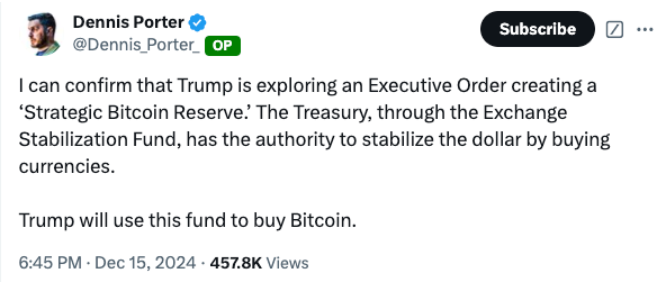
Dennis Porter announces that Trump is researching an executive order on a strategic Bit reserve. Source: Dennis Porter
So far, Trump's team has not directly confirmed the claims about the executive order, but when asked on CNBC whether the US would establish a Bit reserve similar to its oil reserve (which could imply legislation), Trump replied: "Yes, I think so."
Due to the Republican dominance in Congress and their slim majority in the Senate, Bit supporters in Trump's team have ample reason to push for the Lummis Act. However, as long as there are a few Republican defectors swayed by the anger of progressives, they may block the passage of the Act, as they see it as handing government wealth over to Bit holders.
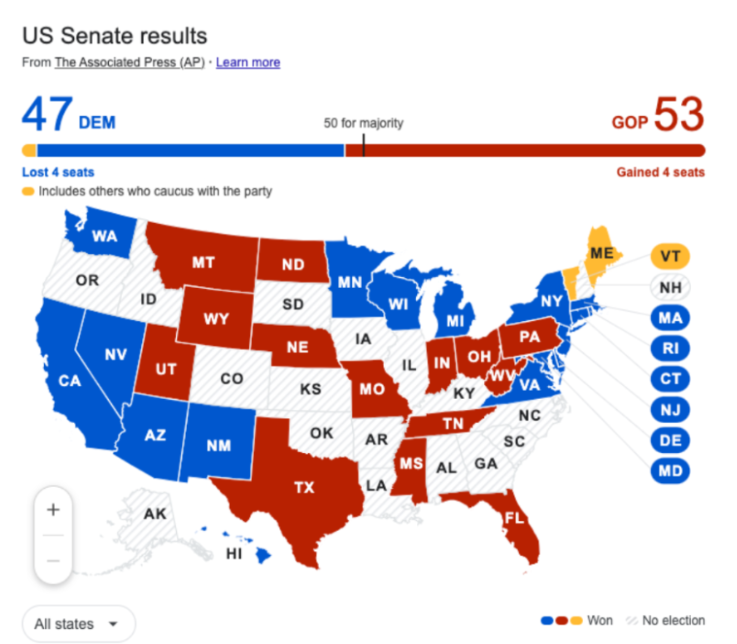
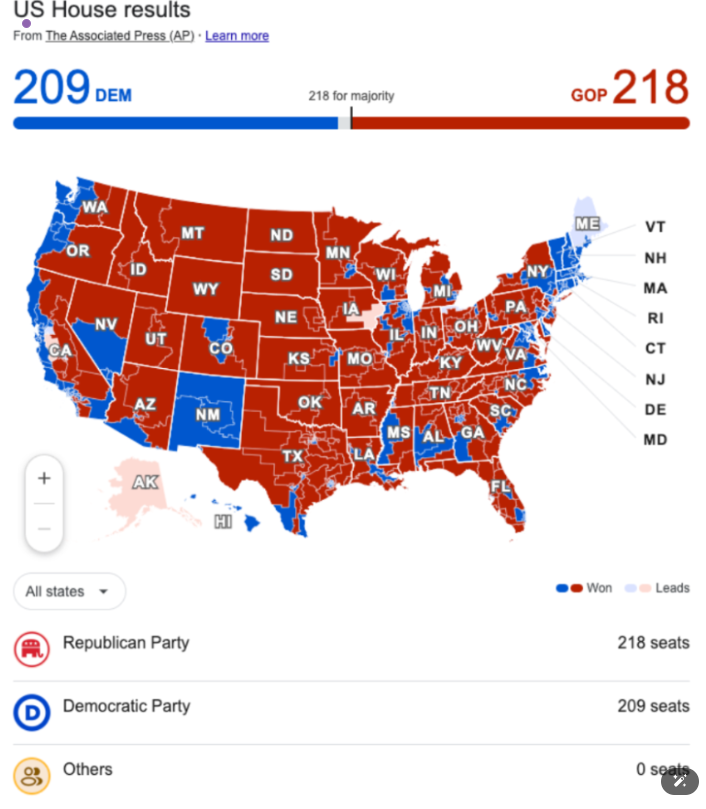
US Senate and House election results after the 2024 election. Source: Associated Press
Don't compare this cycle to previous cycles anymore
Earlier this month, Alex Krüger, founder of the macro digital asset advisory firm Asgard Markets, said the election results make him believe "Bit is very likely to enter a super-cycle".
He believes Bit's unique situation can be compared to gold. After former US President Richard Nixon announced the US abandoning the gold standard and the end of the Bretton Woods system, Bit's price skyrocketed from $35 per ounce in 1971 to $850 in 1981.
Krüger does not rule out the possibility of Bit experiencing bear markets like in the past. However, he urges crypto investors "not to compare this cycle to previous cycles", as this one may be different.
Trump's actions so far clearly indicate that government policy will move in a favorable direction. After Gary's departure, he nominated pro-crypto and deregulation advocate Paul Atkins as the new SEC chairman.
He also nominated crypto supporter Scott Bessent as Treasury Secretary and appointed former PayPal COO David Sacks as the AI and Crypto Czar to develop a clear legal framework for the crypto industry.
The super-cycle theory has never achieved super results
However, the "this cycle is different" concept has appeared in every previous Bit bull market, each time with narratives around mainstream and institutional adoption as support.
During the 2013-2014 bull market, the super-cycle theory was supported by the theory that Bit would become an alternative asset to fiat currencies gaining international attention.
In the 2017-2018 cycle, the rapid price increase was seen as a sign of mainstream financial adoption and Bit's acceptance into the mainstream, with the belief that institutional interest would flourish.
In the 2020-2021 cycle, when tech companies like MicroStrategy, Square, and Tesla entered the Bit market, they believed many tech-related companies would follow suit.
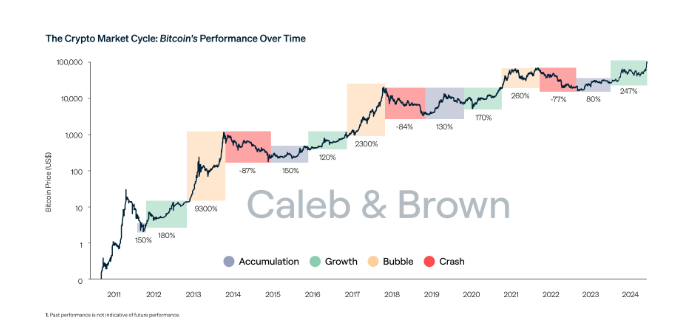
Bit's price performance reaching peaks and troughs in the previous cycles. Source: Caleb & Brown
However, in each cycle, the super-cycle narrative has not materialized, ultimately leading to price crashes, with supporters collapsing and entering prolonged bear markets. Three Arrows Capital co-founder Su Zhu was one of the most prominent supporters of the 2021 super-cycle theory, believing the crypto market would remain bullish even without a sustained bear market, with Bit ultimately reaching a peak of $500,000.
3AC did indeed borrow money as if the super-cycle theory was real, and when it was finally liquidated, the crypto market cap plummeted nearly 50% due to the news, causing the collapse and financial distress of lenders including Voyager Digital, Genesis Trading, and BlockFi.
Therefore, the super-cycle is a dangerous theory and should not be gambled with your life savings.
For Chris Brunsike, partner at venture capital firm Placeholder and former blockchain product lead at ARK Invest, the Bit super-cycle is just a myth.
The super-cycle is undoubtedly a collective delusion.
Nevertheless, considering the support of the US President, the US election results have provided Bit with unprecedented, highly bullish conditions, and the US President appears to be fulfilling his commitment to support crypto, including never selling the Bit in the US Bit reserve.
Potential global domino effect
If the 'Bit Reserve Act' is passed, it could trigger a global race to hold Bit, with other countries also following suit to avoid falling behind.
George S. Georgiades is a lawyer who, in 2016, shifted from providing financing advice to Wall Street companies to serving the Bit currency industry. He told Cointelegraph that the enactment of the Bit Coin Reserve Act "will mark a turning point in global Bit Coin adoption" and could "spur other countries and private institutions to follow suit, driving wider adoption and enhancing market liquidity."
Basel Ismail, CEO of the Bit currency investment analysis platform Blockcircle, agreed and said that the approval would be "one of the most exciting events in Bit currency history" because "it will catalyze a race to acquire as much Bit Coin as possible."
Other countries will have no say, they will be forced to take action. Either pivot, compete, or perish.
He believes that "most of the countries in the G20, which are the most powerful and economically advanced countries in the world, will emulate and establish their own reserves."
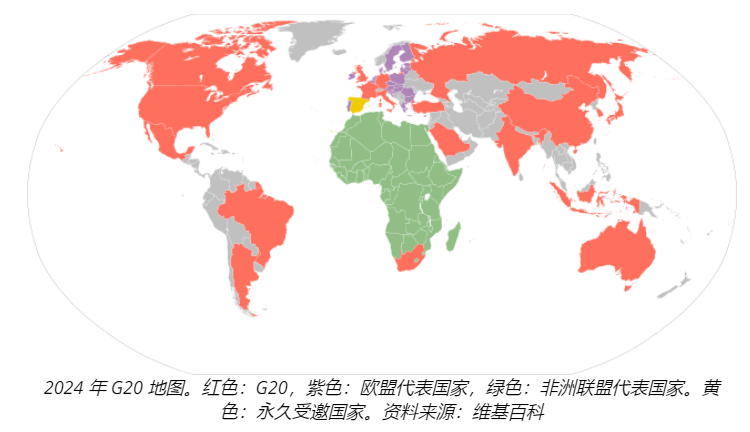
Veteran Bit currency investor and Bit Coin educator Chris Dunn told Cointelegraph that this FOMO-driven buying frenzy between countries could fundamentally change the current Bit currency market cycle.
If the US or other major economic powers start accumulating, Bit Coin could trigger a FOMO that could create a market cycle and supply-demand dynamic unlike anything we've seen before.
OKX exchange president Hong Fang told Cointelegraph that other countries may have already prepared for such a race.
Game theory has likely been quietly at play.
However, Ismail said that most Bit Coin purchases will be made through over-the-counter brokers and settled in block trades, so "it may not have a direct impact on the price of Bit Coin," but will create a persistent demand force that will ultimately drive up the price of Bit Coin.
A new wave of Bit currency investors could change the dynamics of the Bit currency market
If countries become market buyers, the Bit Coin market could undergo a fundamental change. A new wave of investors from global financial centers will flood the Bit currency market, changing market dynamics, psychology, and reactions to certain events.
Nexo analyst Kalchev said that while this legislation may disrupt the well-known four-year Bit Coin halving cycle, it is still speculation, but there may be several dynamic changes.
Bit Coin is a unique market, driven by retail buying and selling so far, with prices highly reactive to market sentiment. The emergence of a new type of investor may change market dynamics and alter historical cycles.
Ismail believes that "the behavior of stock market investors will be different from" the over-reactive retail investors. Institutional investors have deep pockets and sophisticated risk management strategies, allowing them to approach Bit Coin differently than retail investors.
Over time, Wall Street's involvement will help create a more stable, less reactive market environment.
Stability is another way of saying reduced volatility, and logically, this means that bear markets will not be as severe as in past cycles.
Georgiades believes that "price cycles will continue," but "sustained demand from large-scale buyers like the US can reduce volatility and the swings we've seen in past cycles."
At the same time, Ismail pointed out that the performance of the Bit Coin market has already deviated from the previous four-year cycle. Bit Coin's price has broken below the all-time high (ATH) of the previous cycle in the current cycle, "which everyone thought was impossible," and then set a new ATH before the official halving.
The four-year cycle has been repeatedly exposed and broken
So far, Bit Coin has only experienced four halvings, with nearly thirty more halving events yet to occur. "It's hard to imagine all of these halvings will follow the same predictable four-year pattern," Kalchev said, especially as broader macroeconomic and political factors (such as central bank policies and regulatory developments) have a greater impact on Bit Coin's market trajectory.
Kalchev believes that Bit Coin's price movements will be less influenced by internal mechanisms like halvings and more influenced by external factors like institutional adoption and geopolitical events.







